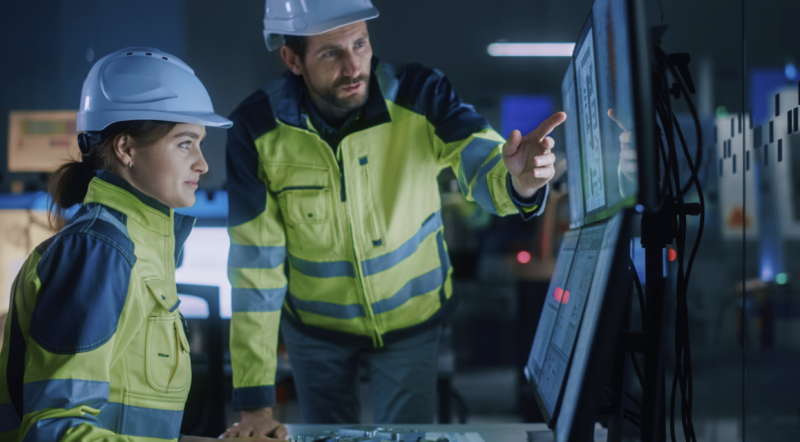Last Updated on: 12th December 2023, 11:15 am
6 Ways AI Will Shape the Construction Industry in 2024
As we approach 2024, the construction industry in the UK is on the cusp of a significant transformation — and the growth in Artificial Intelligence (AI) technology is pushing changes that will undoubtedly change the construction industry.
The use of AI in construction processes is revolutionising various aspects of the industry — from design and safety to risk assessment and project management.
According to a report by McKinsey, AI adoption doubled between 2017 and 2022. And these figures will be far higher by the end of 2023.
“Adoption [of AI] has more than doubled since 2017, though the proportion of organisations using AI has plateaued between 50 and 60 per cent for the past few years. A set of companies seeing the highest financial returns from AI continue to pull ahead of competitors.”
In this article, let’s look at how AI will continue reshaping the construction industry. It’s a transformative journey in the UK that is growing in every sector. In the construction industry, the use of AI has become increasingly intensive.
Improving Design and Creativity
AI holds immense potential for enhancing the quality of designs in the construction industry. By leveraging AI in construction, companies can analyse vast amounts of data to create predictive models that optimise design concepts.
The algorithms can help engineers in creating complex designs and drawings. Its ability to process thousands of parameters and the largest datasets is unmatched. It can produce design alterations that improve energy efficiency and structural integrity.
Openspace.ai allows for the capturing, indexing and analysing of visual data from construction sites. Architects gain a tool that allows them to quickly present construction designs in real-time on-site or at the office.
AI algorithms are being used to optimise building design, generate new designs and consider factors such as budget, materials and site conditions. The software can run simulations and help identify ways to enhance energy efficiency and space utilisation.
Enhancing Job-Site Safety
Safety is a top priority in the construction industry, and AI offers an innovative approach to improving on-site safety measures. AI-powered computer vision technology on construction sites can analyse video footage to identify potential hazards and non-compliance issues.
This enables site managers to:
- Promptly address safety concerns
- Conduct necessary training sessions
- Streamline incident reporting by monitoring and gathering real-time data through sensors, cameras and IoT devices.
This augments the overall safety culture within the construction industry.
Mitigating Risk
AI can play a crucial role in identifying and mitigating risks in construction projects. By utilising predictive analytics, AI algorithms can:
- Anticipate potential challenges and the impact of risks
- Enable construction professionals to implement preventive measures
- Help reduce safety risks on construction sites by identifying potential hazards
- AI tools help with inspections and gathering real-time data on worker activity
Autodesk AI is an example tool in this field which enables employees to automate repetitive tasks and provide useful predictive insights. A tool that improves productivity must be a useful addition to a company. Some of Autodesk AI’s include:
- Assistive workflows to save time
- Proactively predict and then prevent construction risks
- More information through intelligent search.
Boosting Proactive Facility Management
AI extends its influence from the construction phase to facility management, enhancing the lifespan of assets. Facility managers often face challenges because of incomplete information, making repairs and renovations challenging.
However, AI empowers facility managers with data-driven insights, enabling them to efficiently manage maintenance and extend the longevity of assets. By analysing the historical data and project specifications, AI recommends potential missing submittals, helping teams mitigate risks and allocate resources effectively.
Efficient Project Management
AI-powered project management tools can assist construction managers in:
- Tracking project milestones
- Predicting issues
- Managing resources.
By incorporating real-time data streams and analytics, project managers can monitor job performance, troubleshoot problems and mitigate risks more efficiently.
Procore, for example, is a construction management software platform that helps streamline project management processes. It offers features such as project scheduling, document management, budgeting and collaboration tools. Procore’s AI tools assist with tasks like automating data entry, generating insights from project data and improving efficiency and communication.
Integrated Workflows
AI technologies can streamline workflows and integrate processes, from planning to design to construction. By consolidating data and tools into a single cloud-based platform, all stakeholders can access the same information in real-time and improve collaboration. For example, tools like ClickUp customise workflows and project planning cycles.
What Other Processes Are Influenced by AI?
Here are two examples of how AI can improve the efficiency and strategy of construction work.
- AI-controlled robots can carry out activities that cut labour costs and improve employee safety, such as controlling heavy machinery, excavators and bulldozers.
- Risk management monitored by AI on machinery can highlight proactive maintenance, e.g. machinery issues that can lead to costly repair or building disruptions.
Example Case Studies: Successful AI Implementation in Construction Work
- A Dundee-based thermal imaging firm, IRT, partnered with The Data Lab and used software to process and analyse thermal images to produce reports on heat loss estimates in homes.
- The University of Sheffield Advanced Manufacturing Research Centre (AMRC) explored how AI could automate quality assurance. The aim was to make the process less labour-intensive and speed up the panel inspection process.
The Future Is Now: AI Technology Is Revolutionising Construction Projects
An article on building.com summarised the advantages of AI augmentation perfectly by saying:
“AI can streamline the construction process by optimising schedules, predicting project costs and improving safety.”
To fully capitalise on the potential of AI in the construction industry, companies need to recognise its benefits and invest in training and education for their employees. By embracing AI solutions, construction firms can:
- Improve safety
- Boost efficiency
- Drive innovation in the industry.
Artificial Intelligence is poised to revolutionise the construction industry in Great Britain in the coming months.
As trends and statistics show, the adoption of AI in construction is on the rise. The technology is ensuring a more efficient and sustainable future for the industry. Embracing AI technologies will transform traditional practices and empower construction professionals to deliver projects with increased accuracy, safety and productivity.
With AI as a trusted ally, the construction industry in the UK is well-positioned for a transformative journey in 2024 and beyond.
Security Concerns
However, with the changes in AI comes concerns about information security — i.e., how does AI growth impact company data? CHAS, the UK leader in risk management and compliance accreditation, offers a Common Assessment Standard accreditation covering 13 key areas of risk management. One is information security, which shows a company’s standards in protecting personal data in line with the GDPR, which will be invaluable as AI is increasingly used.






